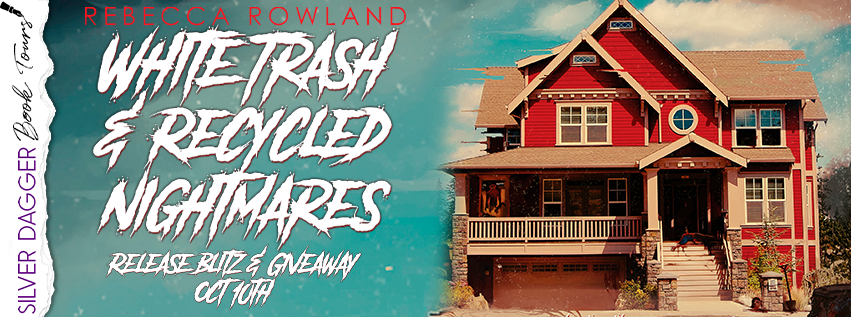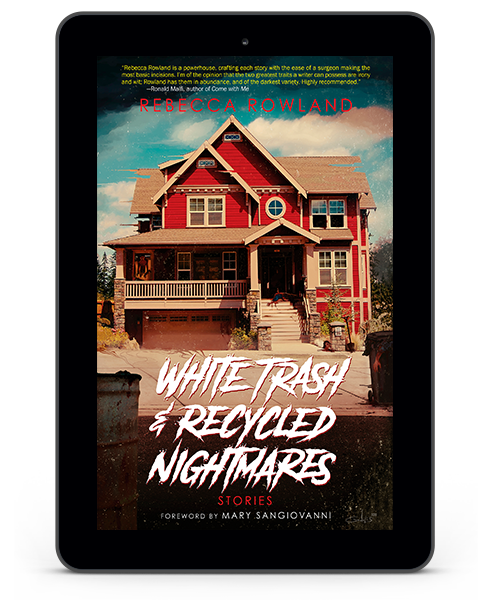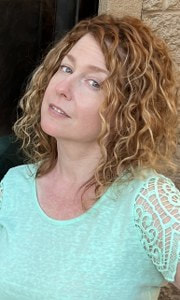The most sinister objects of fear are never truly discarded...just repurposed.
White Trash & Recycled Nightmares
by Rebecca Rowland
Genre: Horror Short Stories
A workaholic splits his time between home and hotel rooms until an anonymous cryptic message arrives, setting off a wrinkle in the time continuum and slowly shredding his sanity. Elsewhere, a woman's jealousy over her spouse's connection with their only child boils over, leading her to see monsters everywhere except the mirror. University fraternity brothers discover that a cruel prank has dire consequences but the full extent of their punishment is yet to come, while an intrepid hiker explores an abandoned Cold War facility hidden within a Massachusetts mountain only to realize that military secrets aren't the only things buried within.
From witches, wendigos, and werecats to sirens, sadists, and serial killers, Rebecca Rowland serves readers a twenty-tale meal of cosmic, creature, and quiet horror in platters heaping with unsettling trepidation. In Rowland's long-awaited follow-up to The Horrors Hiding in Plain Sight, a lighted room provides no safe haven, and in the darkest corner of the basement waits a ravenous dread.
Excerpt from “Layover,” the first story in White Trash & Recycled Nightmares by Rebecca Rowland
When his cell phone’s piercing ring jarred him from deep sleep that evening, Adam was at first disoriented. He squinted at the digital clock nearby, then pawed in the direction of the sound in a scramble to mute it. He kept his ringer off nearly constantly, switching to audible alerts only when sleeping away during a layover as a countermeasure to assuage his anxiety at the hotel’s wake up service. After silencing the sound, he glanced over at Diane, a barely visible shape motionless two feet away.
The screen on his phone read Unknown Caller. He tapped the green button, pressed the receiver to his ear, and whispered, “Hello?”
There was silence on the other end, and Adam assumed the party had hung up, a misdial realized too late to unring the nocturnal disturbance. He was beginning to pull the phone from his ear when he heard it: a quick breath, like a gasp of surprise, and then another sound. A piercing wail screamed from the earpiece: a long, unending shriek of terror, primal and desperate. It stabbed Adam’s eardrum like a sharp blade twisting into his brain. Startled, Adam dropped the phone, and the cell bounced off the mattress, against the edge of the nightstand, and onto the hardwood floor. Shaken and still disorientated, Adam jumped out of bed, snatched the phone from the ground, ran to the bathroom, and flicked the light switch. The stark white radiance was as jarring as the scream had been. Adam looked at the screen again. The caller had hung up. In its place was his regular wallpaper, the photo of him and Diane with Janie between them, the three sitting on a bench overlooking Wells Beach, watching the tide come in.
But the eerie scream still echoed in his ear.
Adam rubbed the stubble on his face and looked at himself in the mirror. His face seemed hollower than usual. Dark circles punctuated his bloodshot eyes. He was due back to work in six hours and he’d only slept for three. He placed the phone on the sink and opened the medicine cabinet, rustling through the arsenal of face creams and pain relievers the couple hoarded, finally discovering an expired but nearly full bottle of Xanax. He shook two tablets into his palm and then onto his tongue, dry swallowing them even though the crystal holder nearby overflowed with disposable cups. He’d be groggy in the morning, but at least he’d get some sleep.
###
The next evening, Adam lay stretched out on top of the scratchy blue quilt of the hotel room, a pile of obstinate pillows lodged between him and the headboard and a battalion of tiny vodka bottles he’d smuggled from the plane standing guard at the room service menu on the nearby desk. He’d hovered at the bar near the lobby for over an hour with no prospects for evening company and finally resigned himself to a few hours of bad television alone. He thought about calling Marie, but he was in Los Angeles, and what would be the point? To talk? Were they high school sweethearts? He picked up his cell three times but stopped himself before dialing, imagining her laughter tinkling through the receiver. Oh, Adam, you’re so funny. But why don’t you call when you’re in San Diego, yeah? The honeyed voice drizzled over the barely audible push to get him off the line so that she could get ready for a date, for a night out with the girls, for a quick tumble with another traveler waiting for her in bed in the next room.
Adam selected a bottle from the congregation and twisted its tiny cap. He didn’t bother to pour the liquid into a glass but drank right from its tiny top, feeling a bit like he always did at one of Janie’s tea parties, the cups and plates three sizes too small for his hands. He realized he’d forgotten to eat dinner and leafed through the menu but found nothing appetizing and instead, used the nearby remote to turn on the television. Immediately, the screen buzzed to life, an available channel lineup with current show listings cascading downward.
His phone vibrated beside him. This time, it wasn’t a call but a text alert from a number he did not recognize. He tapped the screen to open the message. It contained no words, only a photograph. Adam dropped the empty bottle onto the carpet beside the bed and spread his fingers on the screen to magnify what he was seeing.
At first, Adam thought it must be a crime scene photo, one of those fuzzy reproductions that forensic documentaries flashed across the screen for shock value, the victims’ faces, and sometimes, exposed genitals, strategically blurred to appease the ratings police. But the photograph wasn’t grainy. It wasn’t a screenshot of a web image or a captured shot from the television. It showed no sign of pixelation. It had been taken first-hand, and nothing on the subject had been censored.
The boy looked about seventeen, perhaps eighteen, years old. He was tall and thin in that late-adolescence awkward sort of way; even as his body lay lifeless on its side, the boy’s shoulders curved forward as if still self-conscious about his height. His lips were slightly parted in a small o, and a maroonish stain had dried into a crusty blotch along the patches of hormonal acne dotting one side of his face. His hair was deep brown and slightly disshelved, like someone had recently tousled it or removed a baseball cap too quickly, and his eyes…Adam looked closer. His eyes were entirely black, the pupils having swallowed the irises whole.
The boy was wearing a bright red t-shirt, and as Adam let his fingers move the screen downward, he realized, that was all he was wearing. That is, the boy, or what remained of him, ended at the torso. His legs appeared to be missing, or crushed beyond recognition, the area below his waist dissolving into a charred tangle of metallic debris and meaty pulp.
Adam turned the phone onto the quilt, face-down. He felt his stomach buckle and a sheen of sweat bead along his face. He closed his eyes and took a deep breath, then opened them and began unscrewing another of the vodka nips; he was bringing the bottle to his lips as he picked up the cell again and dialed Marie’s number.
Hey there, her voice purred after one ring. It’s Marie. You know what to do. A beep.
He clicked the red End Call button, then dialed another number. This time, a live person picked up and greeted him.
“I was just thinking of you,” Diane said sleepily. “How’s your day? What is it, nine o’clock there?”
Adam swallowed, felt the alcohol burn a path down his esophagus and into his stomach. “Yeah, about that,” he said finally. “Is everything okay? Are you and Janie okay?” he asked nervously.
“Wha—?” Diane’s concern reverberated through the receiver. “Yes, we’re fine, everyone’s fine. What’s the matter?”
Adam paused, collected himself. “Yes, yes, everything is good. I just wanted to hear your voice, Dee,” he said. “How is Janie? Did the weather cooperate for practice?”
Diane breathed a small sigh. “Oh, yeah. Rain held off the whole time. She is loving it so far. Exhausted, though. Out like a light right after dinner.” She was quiet for a beat. “Have you been drinking? You’re slurring your words a bit.”
Adam’s eyes drifted to the room service menu beside his hip. “Just a little. I forgot to eat supper. I’m ordering something now, I promise.” He picked up the booklet and opened it once more. He’d force himself to eat something, anything, just as soon as he got off the phone. He silently scolded himself for drinking too much on an empty stomach.
“Okay, well, I was just about to get into bed,” Diane said, her voice still concerned. “Are you sure you’re okay, Addy?”
Adam pressed his fingers into his eyebrows and kneaded slightly. “I’m good. I’ll be home on Tuesday. Long day is all.”
They exchanged goodnights and Adam held the phone in his hand for a moment after hanging up. He took a deep breath and opened his text messages, scrolling up and down the list of senders again and again.
The message containing the photograph of the mangled boy was gone.
##Includes a foreword by Mary SanGiovanni.
Advance praise for White Trash & Recycled Nightmares
"Rowland's confident and poetic prose slices its way under your skin and lifts the veil on visceral, disturbing, and shocking terrors residing just beneath the norm.” -Tim Lebbon, bestselling author of The Last Storm
"There's nobody out there like Rebecca Rowland. These stories are razor-sharp, clever, and horrifying in all the best ways. Read everything she's written, starting with this collection." -Gwendolyn Kiste, Three-time Bram Stoker Award-winning author of The Rust Maidens and Reluctant Immortals
"A powerfully evocative collection—packed with beautiful writing and deeply unsettling stories.” -Brian Keene
“Rebecca Rowland is a dangerous lady. She is cynical, lascivious, ironic, blood-thirsty, ice-cold, but also warmly feminist (unless the gals aren't worth it), a guy-lover (until the boys get a little too much toxic masculinity), and at any moment, she's ready to throw old snow beasts, walls of giant bugs, and…well, what's your nightmare? She will hand it to you freshly minted and explode your mind. You've been warned. Now read this book.”-Felice Picano
“These are some nasty stories with brutal, heartbreaking endings and shocking revelations. Rowland’s characters feel like real people, so much so that you won’t necessarily want those stories to end.” -Paula D. Ashe, Shirley Jackson Award-winning author of We Are Here to Hurt Each Other
"Sometimes shocking, sometimes mean, but always darkly entertaining, Rowland's WHITE TRASH & RECYCLED NIGHTMARES makes the dread tangible in each story.” -Kevin Kangas, director of Fear of Clowns
"Rebecca Rowland comes with all guns blazing. WHITE TRASH & RECYCLED NIGHTMARES is a top-tier collection of stories that fans of horror fiction will devour. The writing and characters are strong, and the concepts are both sinister and memorable.
Make some space on your shelf for this one.” -Rio Youers
Amazon * B&N * Caprichos Books * Bookshop * Kobo * Bookbub * Goodreads
Rebecca Rowland is the dark fiction author of two fiction collections, one novel, a handful of novellas, and too many short stories. She is also the editor of seven horror anthologies, and her speculative fiction, critical essays, and book reviews regularly appear in a variety of online and print venues. A New England native, Rebecca has lived all over Massachusetts and as a result, chooses to torture most of her characters there.








No comments:
Post a Comment